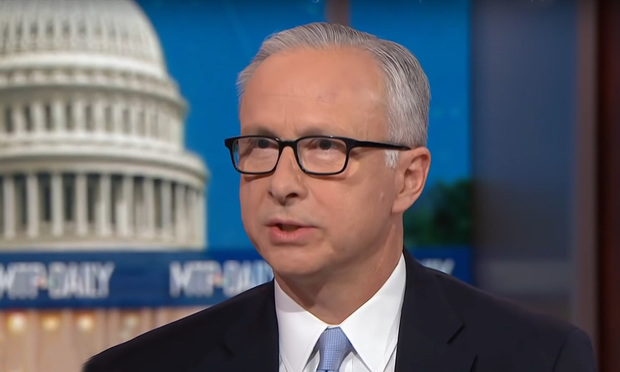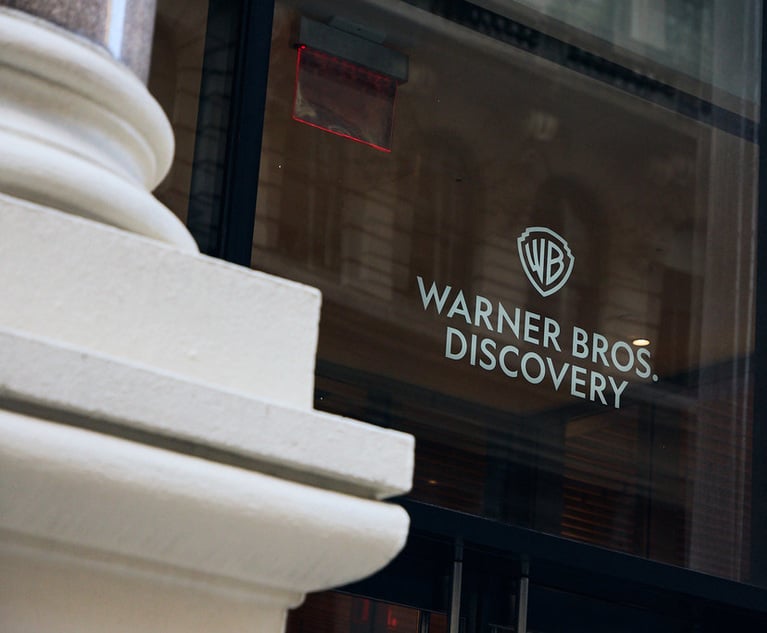FBI General Counsel Who Battled Apple Over Encryption Now Embraces 'Going Dark'
Jim Baker, who served as the FBI's top lawyer for four years, says it's time to "deal with reality" and realize that the government must embrace encryption for national security, even if doing so hinders law enforcement's ability to investigate some crimes.
October 24, 2019 at 04:30 PM
4 minute read
 The FBI's former general counsel, Jim Baker. Photo: YouTube
The FBI's former general counsel, Jim Baker. Photo: YouTube
As the FBI's top lawyer, Jim Baker once butted heads with Apple Inc. and CEO Tim Cook over the tech giant's refusal to help law enforcement unlock the San Bernardino, California, shooter's iPhone. Now, three years later, Baker has done an apparent about-face—he's espousing strong encryption as being vital to national security.
Baker wrote earlier this week in a blog post for Lawfare that he's had time to reflect and make "efforts to embrace reality with respect to some aspects of several interrelated subject areas that have comprised a substantial part of my career: national security, cybersecurity, counterintelligence, surveillance, encryption and China.
"In the face of congressional inaction, and in light of the magnitude of the threat, it is time for governmental authorities—including law enforcement—to embrace encryption because it is one of the few mechanisms that the United States and its allies can use to more effectively protect themselves from existential cybersecurity threats, particularly from China," he added. "This is true even though encryption will impose costs on society, especially victims of other types of crime."
Baker was the FBI's top lawyer from 2014 until late 2017. He left the bureau last May and now serves as director of national security and cybersecurity for the R Street Institute, a nonprofit, nonpartisan, public policy research organization based in Washington, D.C. He's also a CNN legal analyst and lecturer at Harvard Law School.
He said in an interview Thursday that he spent about 10 months working on the blog post, but the "thinking process began years ago as I learned more and more about Huawei and what they were doing," referring to the Chinese telecom giant and its 5G mobile network.
"A few people have emailed me. The feedback has been positive so far," he added. "I have not heard from friends in law enforcement yet. I will be eager to hear their reaction."
In his blog post, Baker asserts that he still "stands by his work" in the FBI's conflict with Apple over encryption in 2016, which ended when the government found a way to unlock the shooter's phone without Apple's assistance.
But he argues that the solution in the San Bernardino case is "inadequate to address the larger going-dark encryption problem," which pits the interests of law enforcement against privacy and cybersecurity advocates. Going dark refers to using encryption to cloak data.
Baker asserts that the U.S. must face the reality of operating in a "zero-trust interconnected world," where encryption will be one of the ways to protect sensitive data transmitted through networks and devices that might be compromised.
Describing the security threat that China poses to the U.S. as "profound," Baker urged law enforcement officials to "become among the strongest supporters of widely available strong encryption."
He acknowledged that his message might "be a bitter pill for some in law enforcement and other public safety fields to swallow, and many people will reject it outright. It may make some of my former colleagues angry at me. I expect that some will say that I'm simply joining others who have left the government and switched sides on encryption to curry favor with the tech sector in order to get a job. That is wrong."
Baker concludes by saying that he "found it painful to write this piece, especially since I worked for so many years in the Justice Department and the FBI on the going dark problem without ever finding a viable solution. I have no choice but to admit that I failed in that regard.
"But we all need to deal with reality," he adds.
This content has been archived. It is available through our partners, LexisNexis® and Bloomberg Law.
To view this content, please continue to their sites.
Not a Lexis Subscriber?
Subscribe Now
Not a Bloomberg Law Subscriber?
Subscribe Now
NOT FOR REPRINT
© 2025 ALM Global, LLC, All Rights Reserved. Request academic re-use from www.copyright.com. All other uses, submit a request to [email protected]. For more information visit Asset & Logo Licensing.
You Might Like
View All
Apple GC’s Compensation Flat Again in 2024, but She Might Snag No. 1 Spot on Top-Paid List Anyway


SEC Puts Beat Down on Ex-Wrestling CEO Vince McMahon for Not Reporting Settlements
3 minute readTrending Stories
- 1California Lawmakers Reach $50M Deal to Fund Legal Fights Against Trump
- 2Supreme Court Wrestles With Disabled Ex-Firefighter's Discrimination Case
- 3NJ Firm Narrowly Avoids Case Dismissal Over Lengthy Complaint Filed in Fed Court
- 4Arbitrators Under Fire for Allegedly Forcing Workers to 'Stay or Pay' Employers
- 5Plaintiff Narrowly Avoids Dismissal Over Lengthy Complaint Filed in Federal Court
Who Got The Work
Michael G. Bongiorno, Andrew Scott Dulberg and Elizabeth E. Driscoll from Wilmer Cutler Pickering Hale and Dorr have stepped in to represent Symbotic Inc., an A.I.-enabled technology platform that focuses on increasing supply chain efficiency, and other defendants in a pending shareholder derivative lawsuit. The case, filed Oct. 2 in Massachusetts District Court by the Brown Law Firm on behalf of Stephen Austen, accuses certain officers and directors of misleading investors in regard to Symbotic's potential for margin growth by failing to disclose that the company was not equipped to timely deploy its systems or manage expenses through project delays. The case, assigned to U.S. District Judge Nathaniel M. Gorton, is 1:24-cv-12522, Austen v. Cohen et al.
Who Got The Work
Edmund Polubinski and Marie Killmond of Davis Polk & Wardwell have entered appearances for data platform software development company MongoDB and other defendants in a pending shareholder derivative lawsuit. The action, filed Oct. 7 in New York Southern District Court by the Brown Law Firm, accuses the company's directors and/or officers of falsely expressing confidence in the company’s restructuring of its sales incentive plan and downplaying the severity of decreases in its upfront commitments. The case is 1:24-cv-07594, Roy v. Ittycheria et al.
Who Got The Work
Amy O. Bruchs and Kurt F. Ellison of Michael Best & Friedrich have entered appearances for Epic Systems Corp. in a pending employment discrimination lawsuit. The suit was filed Sept. 7 in Wisconsin Western District Court by Levine Eisberner LLC and Siri & Glimstad on behalf of a project manager who claims that he was wrongfully terminated after applying for a religious exemption to the defendant's COVID-19 vaccine mandate. The case, assigned to U.S. Magistrate Judge Anita Marie Boor, is 3:24-cv-00630, Secker, Nathan v. Epic Systems Corporation.
Who Got The Work
David X. Sullivan, Thomas J. Finn and Gregory A. Hall from McCarter & English have entered appearances for Sunrun Installation Services in a pending civil rights lawsuit. The complaint was filed Sept. 4 in Connecticut District Court by attorney Robert M. Berke on behalf of former employee George Edward Steins, who was arrested and charged with employing an unregistered home improvement salesperson. The complaint alleges that had Sunrun informed the Connecticut Department of Consumer Protection that the plaintiff's employment had ended in 2017 and that he no longer held Sunrun's home improvement contractor license, he would not have been hit with charges, which were dismissed in May 2024. The case, assigned to U.S. District Judge Jeffrey A. Meyer, is 3:24-cv-01423, Steins v. Sunrun, Inc. et al.
Who Got The Work
Greenberg Traurig shareholder Joshua L. Raskin has entered an appearance for boohoo.com UK Ltd. in a pending patent infringement lawsuit. The suit, filed Sept. 3 in Texas Eastern District Court by Rozier Hardt McDonough on behalf of Alto Dynamics, asserts five patents related to an online shopping platform. The case, assigned to U.S. District Judge Rodney Gilstrap, is 2:24-cv-00719, Alto Dynamics, LLC v. boohoo.com UK Limited.
Featured Firms
Law Offices of Gary Martin Hays & Associates, P.C.
(470) 294-1674
Law Offices of Mark E. Salomone
(857) 444-6468
Smith & Hassler
(713) 739-1250







